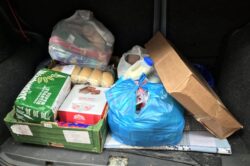Councils get more money to help struggling households
Starting in April, local authorities in England will receive a share of £842m from the Household Support Fund to assist households struggling the most with rising prices. Information about accessing the new funding will be updated on council websites in the coming weeks.
Each council will decide how to use the money, resulting in a wide range of approaches, from ordering affordable food boxes to delivering energy-saving packs with air fryers and slow cookers.
The funding has been provided every six months since October 2021 to fill in gaps in support for struggling households. Although this latest government funding is intended to last for a year, demand has been so high in some areas that the money from previous rounds has run out within weeks.
The surge in prices over the past year has placed financial pressure on many households, with inflation remaining near a 40-year high.
Voucher programs and energy saver packs
Different methods have been chosen by councils to distribute the money to those in need.

Blackpool Council created a market voucher program, offering vouchers for fresh food from the local markets to households with children and pensioners.
Wokingham Council provided 650 energy-saving packs, which included air fryers, slow cookers, heated blankets, thermal clothing, draft excluders, and LED light bulbs.
Blackburn Council purchased food from a distributor for affordable food boxes, and Derbyshire Council sent out vouchers to schools and health professionals for households most in need.
Many councils have targeted support towards specific groups, with households with large families, single-parent households, older people on a low income, and those with disabilities benefitting in some areas.
The poorest areas receive a greater proportion of the funding, and equivalent funding will be provided to devolved nations.
Birmingham will receive the most funding, with over £25m expected in April. Kent will receive £22m, Lancashire will receive £19m, and Essex will get £18m.
While the amount given in April is double that given over the past six months, it is intended to last for a year, and with rising food and energy prices, there is likely to be higher demand, with more people being considered vulnerable.





